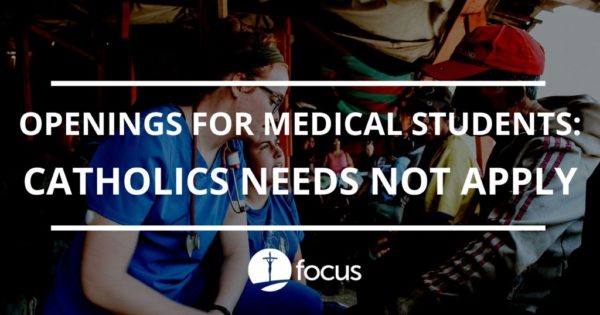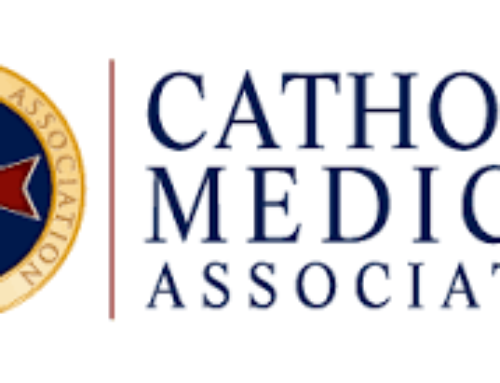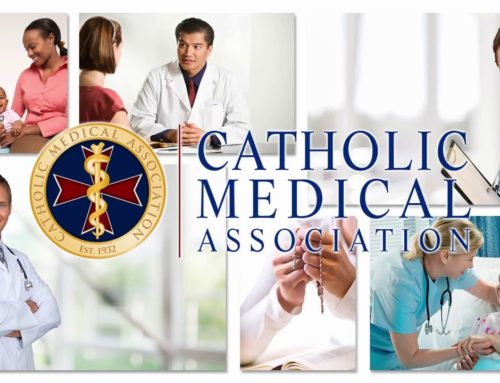MARCH 7, 2023 BYDR. THOMAS MCGOVERN
I have met and heard about many Catholic students who feel a tug to become doctors or nurses and yet pursue different professions because they believed that institutions for schooling and training do not want or allow Catholics to act Catholic. Some students think that it’s no longer possible to be a good Catholic and a good doctor or nurse.
During SEEK23, I hosted a panel discussion for aspiring healthcare professionals. Nearly 500 students attended, and one of the questions asked in that session highlights this challenge:
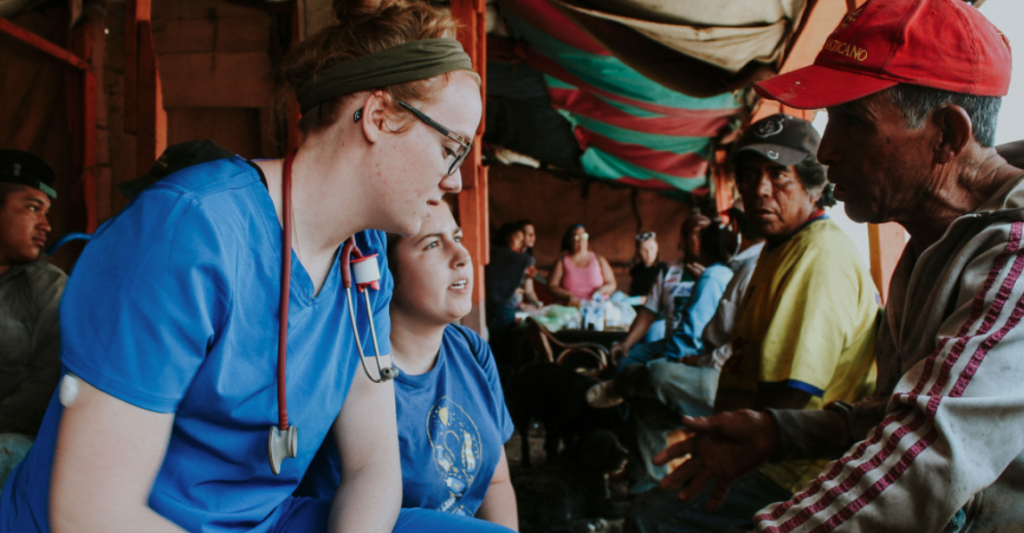
What is a specific time where practicing medicine in a fully Catholic way was challenging or stood in the way of your reputation or professional goals? What did you do? What advice do you have for medical students when their faith is challenged?
After graduating from Mayo medical school on a U.S. Army scholarship, I reported to active duty at Eisenhower Army Medical Center at Fort Gordon, Georgia. When I received my schedule, I found obstetrics and gynecology filling my first two four-week blocks. I knew what I had to do, and I was afraid.
I informed my internship advisor that I was willing to serve as a member of the Ob/Gyn team, but that I would not prescribe contraceptives or assist in sterilizations. (There, I thought, I did my part.)
The next day, I was informed that I would not be allowed to participate in the Ob/Gyn rotation because I would be “useless to them”, in the words of the department head (who flew his private plane around the Southeast doing abortions in his spare time). He told the other three residents on the rotation that, because of me, they would have to spend every third night on call in the hospital for eight weeks instead of every fourth night. Those three didn’t keep it a secret from the rest of the hospital. So, for the next 12 months I was treated as a pariah, even though I never once initiated a conversation about the topic of contraception or sterilization.
It seemed like acting Catholic was blackening my reputation and blocking my professional goal of getting accepted into a highly competitive residency program (ophthalmology was my goal at the time).
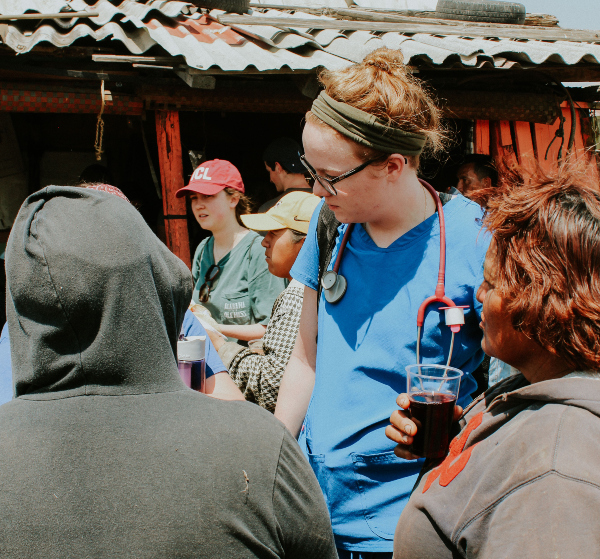
Instead of working in ob/gyn, I was farmed out to the general surgery team where I got to spend the most physically and emotionally grueling month of my internship. Nevertheless, after four 80-100 hour weeks, the general surgeons paid me the highest compliment they could by asking me if I wanted to join their program. I thanked them for the offer and declined it.
So, for the second four-week block, I was handed the greatest gift an intern could be given – a rotation of my choice! Wow!
I polled older residents who had spent time as general medical officers doing sick calls for a few years after their internships. I asked what specialty they wish they had known better. The answer came back: “Dermatology – we saw all kinds of rashes and didn’t know what the heck we were looking at.” Although I had despised my dermatology experiences in medical school, I took their advice.
On that dermatology rotation, I met a man who changed my life. Doctor Marshall Guill spent lunch hours going through pictures of unknown skin conditions and had me guess what they were; he reviewed a dermatology textbook with me that I voraciously consumed; and he taught me how to do simple procedures to treat skin disease. After two weeks, he said something that none of my teachers, mentors, or role models had ever said to me, “Tom, you should consider becoming a dermatologist. You’d be good at it.”
That was an earthquake. For the first time in my medical training, someone told me I was good at something.
And for the first time in my life, I made a life-altering decision based on gut instinct. A future as a dermatologist resonated in my depths. I didn’t need to weigh a lot of pros and cons and stew interminably about my career. And because of Dr. Guill, I have spent thirty years in a specialty I greatly enjoy. Without him, I wouldn’t be a dermatologist who gets to cure cancer every day operating on and repairing people’s faces. And without acting like an intentional Catholic, I never would have been placed in the position to meet him.
Since dermatology was a highly sought after specialty, I had to pay my dues by spending two years as a general medical officer, and then hope to get into a residency program. God had yet another gift. Since my superiors realized that I wouldn’t prescribe contraceptives in troop medical clinics, they asked if I’d like a research position. I said, “Sure, that sounds like a lot of fun!”
For two years I got to perform clinical infectious disease research, including with vaccine development at Fort Detrick, Maryland. That experience greatly strengthened my application for a dermatology residency position.
Fast forward 30 years to the pandemic. That research experience played an important role as the podcast and radio show I co-host, Doctor, Doctor, produced over 60 episodes on the topic. It also enabled me to write numerous articles, appear on many radio and TV segments, and help write the documents that the bishops used to guide their safety decisions during the pandemic. Who knew that would happen? Again, had I not been faithful to my call as a Catholic in medicine, this would have never happened.
The patriarch Joseph said to his brothers who had sold him into slavery, “You meant evil against me; but God meant it for good” (Genesis 50:20). What felt like evil from the chair of Ob/Gyn, God meant for good and used it to utterly change the trajectory of my life.
Based on those and other experiences, I offer the following advice for health care professional students when their faith is challenged:
1. THANK GOD FOR THE CHALLENGE
Lean into the challenge. Reframe those fearful times as opportunities that God is providing you to grow in virtue. Listen to this episode of the Golden Hour podcast with Catholic psychiatrist, Dr. Kevin Majeres. Learning how to reframe daily challenges will change your life.
2. SUFFER WITH JESUS
Why did Jesus endure the pain and disgrace of the Cross? For the JOY set before him (Hebrews 12:2)! There is joy on the other side of your challenge, but you must go through the challenge to experience the joy.
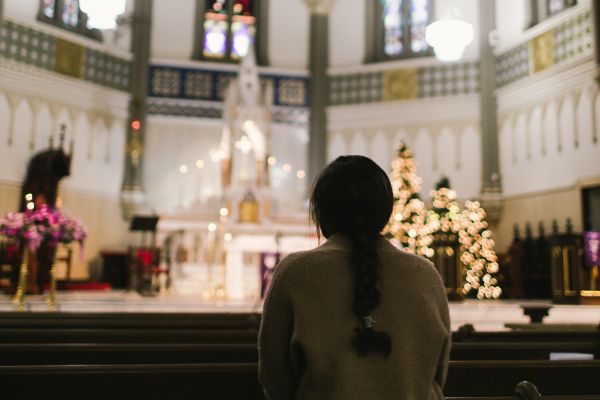
3. GET USED TO DIFFERENT
As GK Chesterton wrote, “A dead thing can go with the stream, but only a living thing can go against it.” It’s not fair that the modern medical culture does not respect human dignity as it should be respected; get used to it. If your faith is alive, you will regularly be expected to swim against the stream.
4. GOD ALWAYS PROVIDES A HOLY OPTION
If you are tempted to give in to secular anti-values that contradict a patient’s or your human dignity, God will always provide an ethical way for you to respond. You never need to sin to follow God’s will (1 Corinthians 10:13). He will make sure you get the training he wants you to have.
5. DEVELOP A SUPPORT NETWORK
You can’t get through training alone. You need a network of deeply Catholic friends who are not in medicine, Catholic peers who are going through the same thing you are, and mentors who have blazed the way ahead of you and are living the kind of life you hope to live.
If you don’t know where to start, contact Novus Medicus, the young members of the Catholic Medical Association, and follow them on Instagram. You can connect to a nationwide community of pre-medical, nursing, and medical students, residents, and young Catholic health professionals.
6. THINK LIKE A CATHOLIC
Secular training programs will not teach you how to think about your patients and medical care through a Catholic lens. Fortunately, the Doctor, Doctor podcast will! For over five years, my co-hosts Chris and Andrew and I have covered over 300 medical subjects from a Catholic perspective that you can search by topic or guest.
7. YOU CAN DO IT
No matter how much certain people do not want faithful Catholics in healthcare, patients need people like us. Many of us are doing it daily, and you can, too.
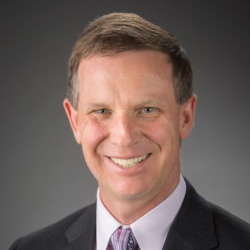
DR. THOMAS MCGOVERN Dr. McGovern was the founding chair of the Novus Medicus Committee of the Catholic Medical Association that oversees outreach to Catholic pre-medical students, medical students, physicians-in-training, and young physicians. He has been co-hosting the award-winning radio show and podcast Doctor, Doctor since early 2018, and he is author of the award-winning book What Christ Suffered: A Doctor’s Journey through the Passion. He lives in Fort Wayne, Indiana with his wife and the two youngest of his seven children.

